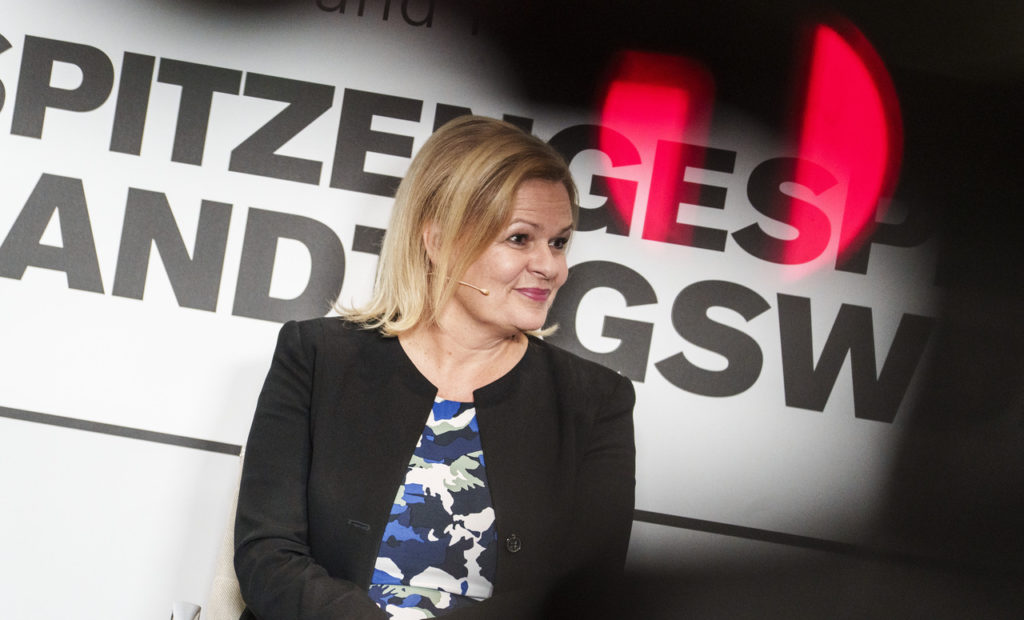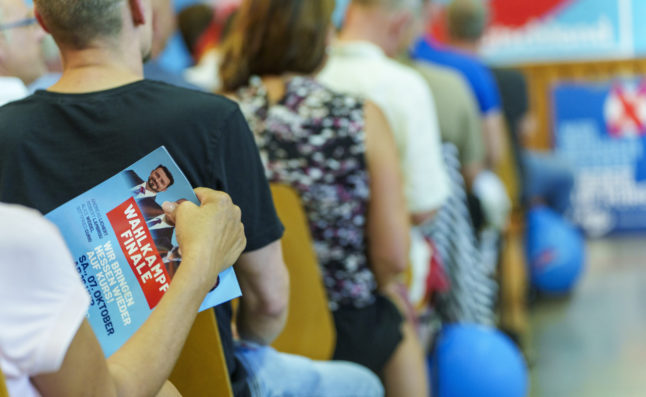On October 8th, the state election will be held in the German state of Hesse – home of the banking hub of Frankfurt am Main – which could have an impact on a federal level, as well as for the state’s international residents.
With 6.4 million inhabitants, the forested central state has been ruled by the Christian Democrats (CDU) uninterrupted for the last 24 years, and is currently governed by a so-called “Black-Green” coalition led by incumbent state premier Boris Rhein alongside the Greens as junior partner.
The state’s current legislative period has been particularly turbulent, with the COVID-19 pandemic, the assassination of Walter Lübke by the far-right as well as the racist attack in Hanau when 11 people were murdered. There was also the suicide of CDU finance minister Thomas Schäfer.
READ ALSO: What is Germany doing to combat the far right after Hanau attacks?
Challenging Rhein in the elections along the Rhine River is a familiar face from national politics, Interior Minister Nancy Faeser of Olaf Scholz’s Social Democrats (SPD). Standing as the head of the Hesse branch of the SPD, Faeser hopes to come in first place and become prime minister of the wealthy state. But the polls aren’t in her favour, with the SPD currently tied neck-and-neck with the Greens at 18 percent, with the CDU significantly ahead at 30 percent.
Here’s what each party is proposing:
Social Democrats (SPD)
The SPD has decided to focus on the shortage of skills, known as the Fachkraftmangel. They claim that Hesse alone will be lacking 180,000 qualified workers in the coming years, whether those are physical labourers, factory workers, daycare workers or teachers.

The Social Democrats have set a number of policies aimed at making immigration easier. These include:
-
Setting diversity quotas in public offices so that “the diversity of society is reflected in state administration”
-
Free integration and German language courses, for EU and non-EU citizens
-
Simplifying the state’s official bureaucratic language and introducing multilingual aids to help people fill in the sometimes complex forms needed to register for life in Germany
-
Allowing non-EU citizens to vote in local elections after 6 years if they have permanent residency
It’s worth noting that the proposal to allow non-EU citizens to vote was initially for after just six months, though this was described as “an editorial error” and changed to six years after backlash.
READ ALSO: REVEALED: The German industries most desperate for skilled workers
Christian Democrats (CDU)
Having governed stably with the Greens through challenging times, Boris Rhein is considered a moderate conservative and has criticised any hints from within his own party that it should cooperate with the far-right AfD. After two and a half decades of state government, the CDU was never going to offer a political revolution in this election. Nevertheless, there are still some new policies which could affect international residents, including:
-
“Hessengeld”: a grant of €10,000 for first-time house buyers, with an additional €5000 for each child
-
Converting former commercial property into housing
-
Enabling access to high-speed fibre optic internet by 2030
-
Creating an independent state secretary for migration issues
-
Making compulsory “rule of law” classes available in every district, as well as introducing measures demanding sufficient German language skills
Greens
Perhaps unsurprisingly, the Greens are primarily focused on building Hesse’s capacity for renewable energy and want to make the state climate-neutral by 2035 at the latest, instead of the current target of 2045. With record polling, the current deputy state premiere Tarek Al-Wazir is presenting himself as a candidate for the state’s top job as Ministerpräsident for the first time, but it is more likely that they will govern again with the CDU as they may not have the votes for a coalition with the SPD and FDP or a left wing red-red-green coalition alongside the SPD and Left Party.
On international issues, the Greens seem to have more in common with the left-leaning SPD than their current coalition partners when it comes to international and migration-related issues. Their policies include:
-
Setting up a welcome centre for skilled international workers which helps with the recognition of foreign qualifications and with residency law
-
Reduction of bureaucracy, with forms written in simple language and provided in languages other than German
-
Expanding public transport, including hourly buses statewide during the day time and a new night bus network.
-
Letting districts decide on their own speed limits in cities
-
Write a state anti-discrimination law and introduce a special prosecutor’s office for hate crimes
-
Allowing asylum seekers to change their status to immigrants, which would allow well-integrated and qualified people to remain in Germany
Free Democrat Party (FDP)
The FDP are quite a small party in Hesse and have declared that their goal is to get over 10 percent of the vote and re-enter government alongside the CDU after nine years in opposition, though this currently seems unlikely as they don’t have enough votes for a coalition with just the CDU. Their priorities will be on business, education, and digitalisation, with policies including:
-
Recognising foreign qualifications quickly
-
Fibre optic and 5G internet for everyone in Hesse by the end of the legislative period by measures such as installing mobile internet masts inside new and renovated publicly funded buildings
-
Introducing fully digitalised e-voting by 2028
-
A digital strategy in schools implementing fast wifi statewide, alongside tablets instead of textbooks and compulsory computer science lessons.
-
Allowing all immigrants to start work immediately
This last rule is set federally, so it is unlikely to change.
Left Party
Hesse was considered the Left Party’s stronghold in western Germany for a long time having entered state parliament in 2008. The current national co-leader of the party Janine Wissler was head of Hesse’s state Left Party before taking the top job.
READ ALSO: Co-leader of Germany’s Left party steps down
But a local sexual harassment scandal, as well as infighting on a national scale, have left the far-left party wondering if it will be able to pass the 5 percent hurdle and re-enter the state parliament this time. They could potentially govern alongside the SPD and Greens like in neighbouring Thuringia. Their policies include:
-
Abolish the scandal-ridden state Office of Constitutional Protection
-
Abolish homework in schools and allow school classes to take place in widely spoken languages other than German
-
Allow workers to choose between working from home or the office
-
Simplify and digitalise public offices and introduce e-government services and citizen’s apps
-
Replace the monthly €49 Deutschland ticket with an annual so-called €365 ticket, following the model of Vienna where residents pay just €1 a day for public transport
-
Limit air traffic at Frankfurt airport to 1995 levels and stop short-term flights
-
Found a publicly owned non-profit housing company and buy or expropriate houses from corporations like Vonovia
Alternative for Germany (AfD)
Despite polling at 14 percent, the far-right AfD are very unlikely to enter state government in Hesse due to the well-established convention in German politics of democratic parties not cooperating with the far-right.
READ ALSO: Why are the far-right AfD doing so well in German polls?
According to local news website Hessenschau, the party’s manifesto (Wahlprogramm) focuses on national and international issues, without many local policies. Nonetheless, there are some policies that could affect international residents and people wanting to move to Hesse from overseas:
-
Recruit skilled workers from non-EU countries only in extreme cases
-
Digitise the housing approvals processes
-
Expanding the A3, A5, A7 and A45 motorways




 Please whitelist us to continue reading.
Please whitelist us to continue reading.
Member comments